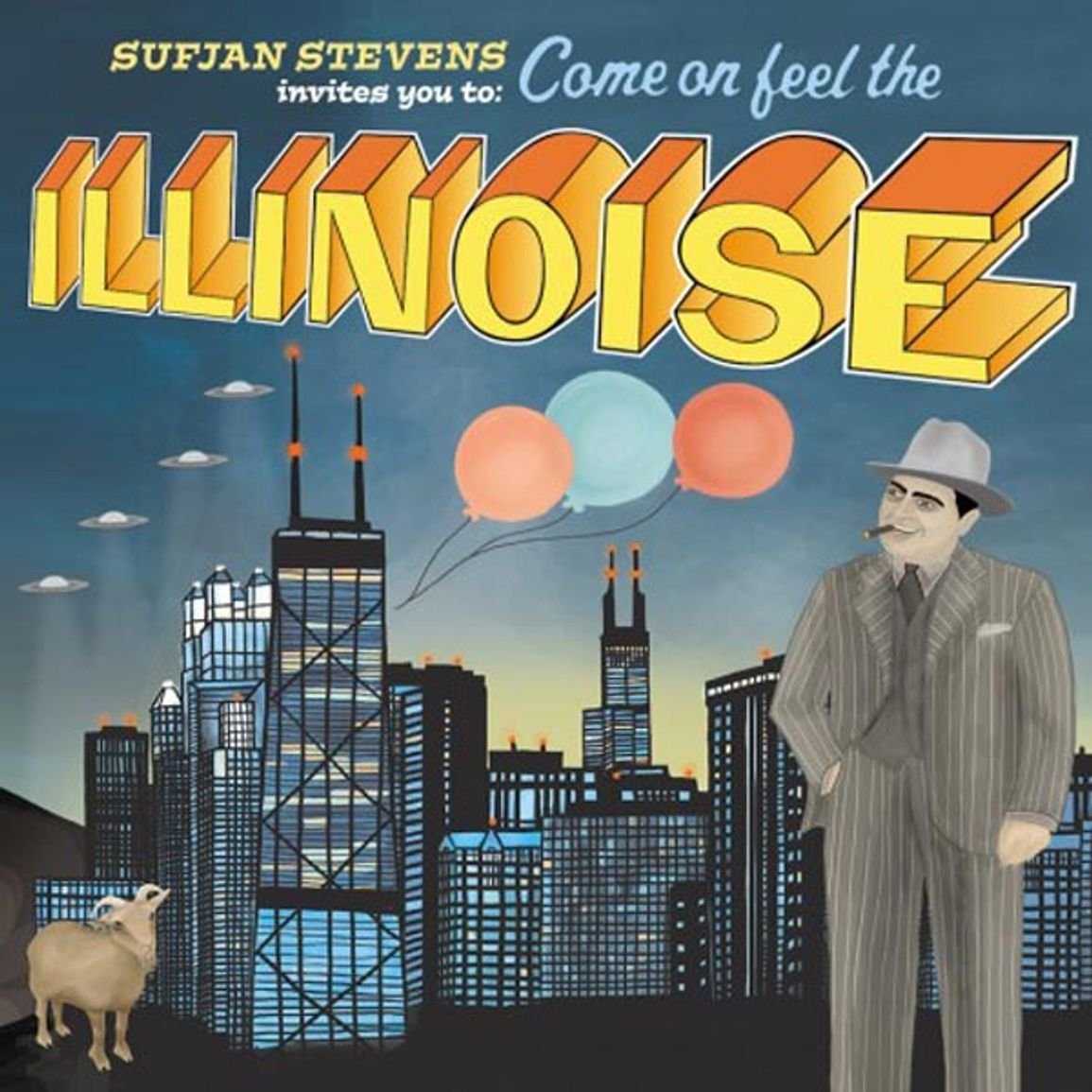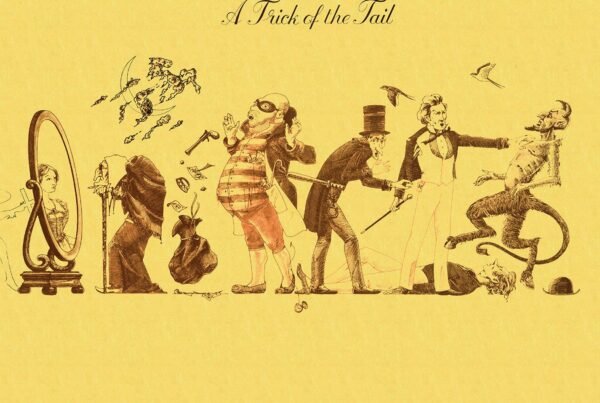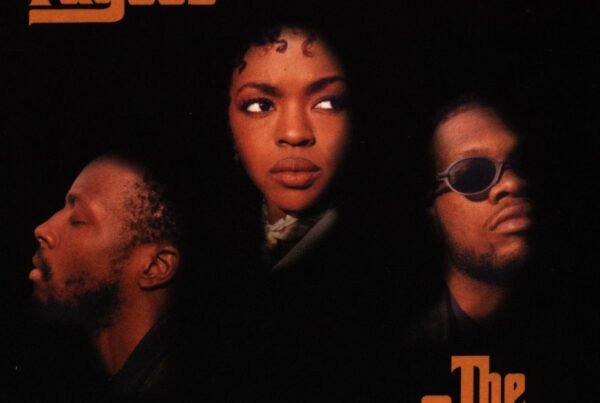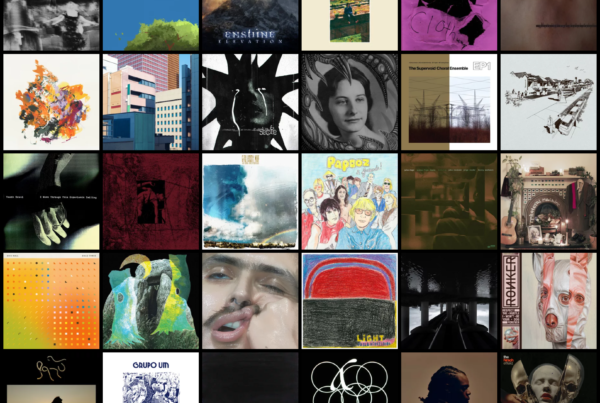‘That is where the magic of this album still lies for me, how thoroughly Stevens studied the history of Illinois and layered it with humanity.‘
-Broc Nelson

Release date: July 4, 2005 | Asthmatic Kitty Records | Facebook | Instagram | Website
As far as ambitious projects go, a 50-album cycle dedicated to the states of the USA is probably pretty high on the list. Although Sufjan Stevens didn’t make it past 2 (who knows if it was even a serious goal of his to make all 50 albums in the first place?), those that were in fact made still remain amongst his most potent and beloved works to date. Illinois has all the charm of a lo-fi bedroom production and all the grandeour of a Broadway spectacle.
Broc Nelson
It has been years since I have listened to Illinois. Revisiting this album for this article has been a weird experience. Like all of these retrospective features, part of it is the joy of nostalgia, but unlike the other A Scene In Retrospect articles that I have participated in, this one does not find me at a time where I still listen to music like this. My indie phase is not entirely gone, but Sufjan Stevens’s poppy indie folk that borderlines Broadway musical vibes (and was, in fact, made into a Tony award winning musical) caught me off guard.
This isn’t a bad thing, just unexpected. Going from a steady diet of hip hop and hardcore to the fluttering flutes and sweet piano of “Concerning The UFO Sighting Near Highland, Illinois” felt jarring at first. Despite being out of my current wheelhouse, Illinois (the album) was something important to me when it came out. For one, it is a fantastic album, lyrically, musically, and culturally. For two, because I am a resident of an area called The Quad Cities, a collection of five cities and numerous outlying towns between Iowa and Illinois divided by the Mississippi River. So, I lived in Illinois (the state) for a decade and have always been very near the state.
While music critics in New York or Los Angeles or wherever the hell major music critics live praised Illinois upon its release and still regard it as one of the best albums of the aughts, being in close physical proximity of the subject matter is an experience they do not have. For example, though it is a triumphant instrumental number, “The Black Hawk War” conjures deeply mixed feelings. Across the Mississippi River Valley from as far north as Wisconsin to Missouri, Chief Black Hawk’s name and image has been co-opted to hundreds (if not thousands) of roads businesses, municipal or educational facilities or programs, and of course sports teams. The sheer vanity and crassness of destroying a tribe and forcing the surrender of a powerful leader only to then name banks and towing services after the Sauk Nation legend is wild colonial behavior, crazy work. The surreal instrumental track has always felt strange, at once apologia yet with a resounding horn-lead fanfare somehow manages to invoke the specter of history with gravitas.
That is where the magic of this album still lies for me, how thoroughly Stevens studied the history of Illinois and layered it with humanity. “Come On! Feel The Illinoise!” covers the conflicting feeling of progress vs commodity in the World’s Fair only to use poet Carl Sandberg as a muse at the end of the song. ‘Are you writing from the heart?‘, the chorus sings like something from a Greek epic or play.
Stevens does write from the heart. On “John Wayne Gacy Jr.” he manages to find sympathy for one of Illinois’ most notorious and depraved murderers, seeing his closeted homosexuality in both Gacy and his victims. “Chicago” veers from the historical nature of Illinois to an auto-biographical track, but like the Second City itself, the song is a masterpiece to behold, busy, full of heart and determination, and the crown jewel of the state and album. “Casimir Pulaski Day” sees Stevens question his faith over the death of a friend on the Illinois-exclusive holiday. “The Predatory Wasp Of The Palisades Is Out To Get Us!” reflects on a young romance Stevens had at summer camp in Palisades State Park, a beautiful area popular with hikers and campers in central Illinois.
Stevens has a good sense of humor, despite many heavy topics. On my favorite song on the album, “Decatur, or, A Round Of Applause For Your Step-Mother!” Stevens rattles through urban legends and historical moments of the city. One of my best friends is from Decatur. I think his telling of the town endears this song to me. His version is one of a stark divide between well-to-do folks and poverty, nascent racism, and the unpleasantness of living in an ADM factory town. ADM (Archer Daniels Midland) is a multi-billion-dollar food processing company that (around here) processes corn and cereal grains into ethanol, high fructose corn syrup, and other processed food commodities. The factories are notoriously stinky. Nearer to me is Clinton, Iowa which always smells terrible. Decatur is no exception. Stevens references this with the line, ‘the sound of the engine and the smell of the grain.‘ You can also learn more about ADM in Decatur from the Matt Damon-lead film The Informant! Stevens feels more whimsical about Decatur than my friend does, and the upbeat song references the underground railroad, Abraham Lincoln, and a Chickenmobile.
These little references throughout Illinois are charming as hell for those of us who live near the places in question. Metropolis, IL, is a small town that claimed Superman. The curse of the goat on The Cubs, Peoria, Rockford, “The Seers Tower” (The Willis Tower neé Sears Tower), the invention of the Ferris wheel, Jane Addams, Benny Goodman, Miles Davis, Ronald Reagan (gross), the names of ghost towns, and more Illinois musicians than I have heard all are little easter eggs for us natives. I’m no slouch for trivia and history, but I am still learning things from this album. Though I wish there was a reference to Edgar Lee Masters’s Spoon River Anthology, or maybe a Mudvayne nod, Stevens did some serious research to make this album.
It is wonderful that this album lives on, and though Stevens has abandoned his 50 states album project Illinois stands as one of his best works. I visit Chicago at least once every year. I would be willing to bet that in the last decade I have heard the song “Chicago” in Chicago more than I have at home. It pops up in restaurants, bars, and in intermission music at venues. Chicagoans, Illinoisians, and at least Quad Citizens love the fuck out of this album. There are many, like me, who normally don’t dabble in the indie pop/folk world who know this album is special. It oozes regional pride while weaving heartfelt emotions into these landmarks, leaping far beyond the novelty of a state-themed album into one of Millennial’s most celebrated and loved records. I could fill a few more pages of personal anecdotes that connect to the themes and subject of this album, but instead, I will suggest that you also form memories around Illinois, whether the album or the state. Twenty years on, and I am still feeling the Illinoise.
Steve Loschi
At some point in the late ‘90s, rock and roll had sold its soul. Music from artists as banal as James Blunt, Third Eye Blind, John Mayer, or Gin Blossoms had taken over whatever was left of the airwaves before it took its final breath, removing whatever rough edges had defined the genre and reduced it to future car commercials or musical beds for the end of a WB teenage drama. By the time the new century rolled around, rock music was pretty much finished as a cultural force, pushed out to the edges of popular influence.
Halfway through the first decade, Sufjan Stevens dropped Illinois, his second entry into what he initially planned on being a 50-record musical analysis of the United States. The fact that he only got two deep is a testament to Stevens’ wry sense of humor and his calculated approach to his artistry. There’s no denying the musical aptitude of the album: despite his lo-fi approach to recording the album, it’s a staggering display of musicianship and song-writing. It often comes across as the soundtrack to a musical made for hipsters, and the fact that the album is now being performed on Broadway just solidifies that fact.
Personally, I was really conflicted when I heard the album twenty years ago when it came out. I felt- like the nineties bands that rang the death knell of rock and roll before him- that it had removed all the danger that made rock and roll exciting. Illinois was non-confrontational, lingering in a world of innocence that seemed color-blind in a post 9/11 world, where hundreds of thousands of civilians were in the process of being killed for an attack they did not do. At the time, Sufjan Stevens was lumped into the world of ‘new folk’, a kind of musical blanket in which we could all collectively hide under to block out the pain and agony of the universe around us.
And yet, Illinois is one of a handful of albums since that time that I find myself coming back to every once in a while. I’ve grown to appreciate the rich, clever arrangements of songs like “Concerning the UFO sighting near Highland, Illinois” or “Chicago” and the unique folk arrangements of “John Wayne Gacy, Jr.” or “Decatur, or, Round of Applause for Your Step-Mother.” The album is steeped in class, and Sufjan displays a musical virtuosity that makes each song seem like a treasure chest of pop music glory. In a sense, it’s a record that continually gives the listener something new to listen to, and not many musicians have the talent to do that.





